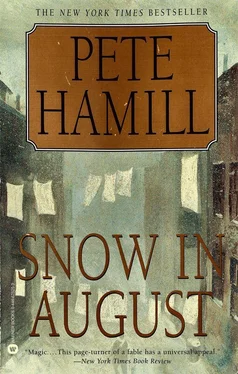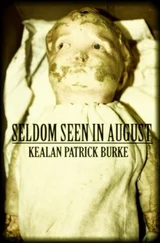“This, right here, this is the Old Jewish Cemetery,” he said, and his voice grew hushed. “Not the one dug up for a building. The cemetery where the dead still sleep.”
In the drawing, Michael saw hundreds of tombstones. No, not hundreds. Thousands . As he moved among them in the tight walled space of the cemetery, with Judah Hirsch as his guide, the stones were jammed together in jumbled disorder, some sinking into the earth, the coffins going twelve layers down, the rabbi said, each bearing words in blocky Hebrew. Michael’s shoes were thick with mud, and then he was sinking into the graveyard and felt a sudden terror; he could sink all the way down, twelve layers deep, to the rotting corpses or bony skeletons of the dead. He lifted a foot with all his strength and the mud made a sucking sound, and then his friend Judah grabbed his arm and pulled him to the safety of a gravel path. A silvery rain began to fall. Some stones bore symbols, which the rabbi explained: scissors on the grave of a tailor, a mortar and pestle for a man who sold medicines, a book to memorialize a printer. Michael could not read the names or the dates on the wet tombstones because all were in Hebrew. Even if he could read Hebrew, the task was impossible; the edges of the letters had been worn away by rain and snow, sun and time. In the Old Jewish Cemetery, not only God had a secret name.
The rabbi pointed to a statue of a man rising dramatically above the tombstones. In the drawing, the man was wearing furled robes and a bucketlike hat, his eyes and face in darkest shadow. Like a true wizard. Not some fake of an alchemist. Michael was certain he could see the eyes burning a bright blue through the shadow.
“This man, very important man,” the rabbi said.
“Who is that?” Michael asked. “He’s got the biggest tombstone in the cemetery.”
The rabbi paused.
“That,” he said, “is Rabbi Loew.”
“L-O-E-W?” Thinking: Like Loew’s Metropolitan on Fulton Street?
“Yes. Judah Loew. I am named for him.”
“Why does he have a separate picture?”
“Because he is the most famous rabbi in the history of Prague.”
“Did you know him?”
Rabbi Hirsch laughed. “No. He is from the sixteenth century and I am born in 1908.”
Eight from forty-seven. Nine. Carry the one. He’s thirty-nine, Michael thought, gazing at Rabbi Hirsch. Maybe thirty-eight, if he was born after February. Just a few years older than my mother. But he looks much older.
“Why was he so famous?” Michael asked.
“A long story,” the rabbi said. “A great story. A… what is the word? Terrible story. But a story that it’s too long to tell you tonight.”
Michael didn’t want to leave. He didn’t want to walk out of the dark wonders of Prague into the ordinary streets of Brooklyn. He wanted to know more about the amazements of the world.
The name of God.
Kabbalah.
Magic.
But he heard himself saying good night.
The cops came to see Michael one Monday night while his mother was working at the Grandview. He was at the kitchen table, rushing through homework before getting to a new Captain Marvel and a Crime Does Not Pay that he had traded for with Jimmy Kabinsky. There were books on the table, his canvas schoolbag open on a chair. His fingers were stained with ink from the leaky fountain pen. The stew his mother had left in the pot was still warm on the stove, his plate in the sink, to be washed and dried before she came home. WNEW played quietly on the radio. Harry James. “Ciribiribin.” He finished the long division and was halfway through the English grammar homework, glancing in a longing way at the cover story on Pretty Boy Floyd in the crime comic, when he heard heavy steps in the hall outside the door. Then a baritone murmur. Two sharp knocks.
“Who is it?” he called.
“Police,” came the voice. “Open up.”
Michael’s heart thumped. This was the first time the police had ever been to their flat. He wished his mother were there.
“Let’s go,” the hard voice said. “We ain’t got all night.”
He opened the door and saw Abbott and Costello, the two detectives who had been moving around the parish for weeks. Up close, Costello was very fat, with slabs of pink flesh framing a small mouth and tiny nose. Abbott had gray skin, deep black circles under his eyes, a flattened prizefighter’s nose, and an unlit cigar wedged between his fingers. Each wore an overcoat. Each wore a gray fedora.
“You Michael Devlin?” Costello said.
“Yes.”
“Your mother home?”
“No. She’s at work.”
“What about your father?”
“He’s dead.”
They gazed warily past Michael into the kitchen.
“You’re alone?”
“Yes.”
They stepped past him, one on either side, and Abbott closed the kitchen door behind him. Their bulk made the kitchen smaller.
“We’re detectives,” the fat one said. They remained standing, eyes moving around the kitchen and into the dark rooms beyond.
“You know Mr. Greenberg? Yossel Greenberg? Guy they call Mister G?”
“I used to go in his candy store. But he moved away.”
“He moved into a hospital, kid,” the gray-faced one said. He put the cigar in his mouth, snapped a lighter, and took a drag. Blue smoke drifted from his mouth. “His skull is fractured in two places. He might never come out alive.”
“We understand you was in the candy store the day he got beat up by this bum Frankie McCarthy,” Costello said.
Michael said nothing. He could feel the knife entering his cheek at the hinge of his jaw and the slash that would give him the mark of the squealer for the rest of his life. He stared at the floor. If he stared long enough, maybe they would be gone when he looked up.
“Well?” the gray-faced Abbott said.
“I don’t know what you’re talking about,” Michael said.
Costello sighed. He put a fat finger on Michael’s catechism book.
“You’re a Catlick, right?” he said.
“Yes.”
“Me too,” he said, wheezing sadly. “And I see a surplice on a hanger over there, so you must be an altar boy, right?”
“Right.”
“I was one too,” he said. “Years ago. Ad Deum qui laetificat and all that.”
“Two altar boys,” the gray-faced cop said. “Fancy that.”
Costello stood over Michael. He picked up the book and dropped it again.
“And I see you study the Baltimore Catechism.”
“Yes.”
“So you know lyin’ is a sin, don’t you?”
“Yes.”
“So why are you lyin’, Michael?”
The boy was quiet for a long moment.
“Maybe you should come back when my mother’s here,” he said in a low voice, looking away from them.
“You think your mother would tell you to lie? She’s a Catlick too. And a brutal crime has been committed. Your mother would understand we can’t put this Frankie McCarthy away unless we got witnesses. And you’re a witness, kid. According to our sources…. So why would you lie?”
“Maybe this explains it,” Abbott said. He was holding up a small Yiddish-English phrase book. Costello took it from him and held it in his short, pudgy fingers.
“A Yiddish phrase book?” Costello said. “I see, said the blind man. I see. It comes clearer. Like maybe you was helpin’ yourself to some stuff in Mister G’s when Frankie was beating him into a pulp?”
“No!” Michael said. He lunged for the phrase book, but Costello held it out of his reach.
“Where’d you get this, then?” the fat cop said.
“Rabbi Hirsch gave it to me,” Michael said.
“Who the hell is Rabbi Hirsch?”
“From the synagogue on Kelly Street,” Michael said. “I’m the Shabbos goy there.”
Читать дальше












